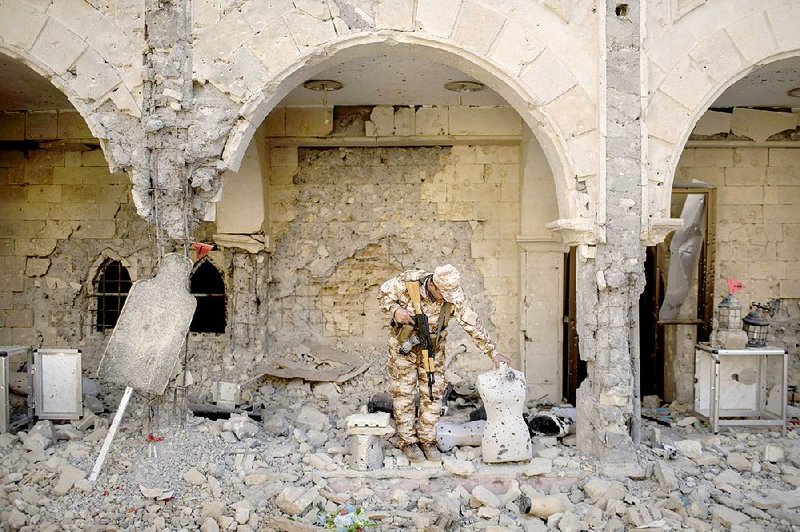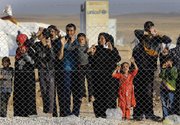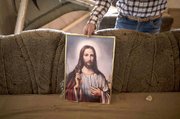BAGHDAD -- A suicide car bomber from the Islamic State militant group attacked Iraqi special forces in Mosul on Saturday, setting off heavy fighting in the northern city.
The morning attack in the Qadisiya neighborhood, which the troops entered a day earlier, was followed by a barrage of gunfire, mortar rounds and rocket-propelled grenades, Iraqi officers said.
Fighting was also underway in the adjoining Arbajiya neighborhood, the officers said, speaking on condition of anonymity because they weren't authorized to brief reporters.
The Iraqi armed forces do not release casualty figures, but field medics have noted dozens of killed and wounded since the operation to liberate Iraq's second-largest city began Oct. 17.
Iraqi special forces entered Mosul earlier this month, gaining a foothold on the city's eastern edges. But the advance has slowed as they push into more densely populated neighborhoods.
"If there were no civilians, we'd just burn it all," said Maj. Gen. Sami al-Aridhi, a counterterrorism commander. He was forced to pause operations in his sector Monday because too many families were clogging the street. "I couldn't bomb with artillery or tanks or heavy weapons. I said, 'We can't do anything.'"
The urban landscape inside Mosul proper makes defense easier for the militants, eager to hold on to the last major Iraqi stronghold of their self-styled caliphate. Defeat in Mosul would be a major blow to their project, and they have said they are ready to fight to the death.
Militants wait to move between fighting positions until people fill the streets, using their presence as protection from airstrikes.
"They always keep them with them," Aridhi said. Other officers said the militants occasionally let a flood of people flee as a method of forcing a pause in the fight.
At their base on the outskirts of the city, Iraqi counterterrorism troops called in airstrikes where they could, radioing to report militant positions and suicide bombers.
Two French advisers sat nearby, watching surveillance feeds of the city's streets.
The voice of a field commander crackled through the radio. "These civilians are making me tired," he said. "They are coming from everywhere. We don't know if they are fighters or civilians. They are carrying bags -- we don't know what's inside."
To the south of the city, militarized Iraqi police have moved within 3 miles of Mosul's airport, which satellite images show has been heavily fortified.
The images, taken earlier this month by U.S.-based private intelligence firm Stratfor, show that Islamic State fighters have cleared terrain and leveled buildings around the airport and a nearby former military base on the west bank of the Tigris River. Rows of concrete barricades, earthen mounds and rubble are blocking other key routes into the city center.
In Hamam al-Alil, a village south of Mosul that was liberated from the Islamic State earlier this month, about a dozen bodies remained strewn among piles of garbage in a mass grave. The militants are believed to have converged there as Iraqi forces closed in on the villages, then fled into Mosul, taking men, women and children for use as human shields. But before the retreat, the militants shot and killed dozens of others at the dump.
The bodies that remained were the ones family members were unable to identify. Some had been decapitated, other had their hands and feet bound. Iraqi officials at the scene said the men were killed purportedly for spying in aid of the operation to retake Mosul or having links to the Iraqi government's security forces.
No efforts to preserve the site were visible Friday, and Iraqi officers said wild dogs were eating at the decaying corpses that lay on the edge of an old agriculture college bombed by coalition aircraft after the Islamic State group converted the sprawling compound into a training base.
In Baghdad, meanwhile, bombings killed at least nine people and wounded 32 others, according to police and medical officials, who spoke on condition of anonymity because they were not authorized to brief reporters.
The deadliest of the attacks hit the Kifah neighborhood in the city center, ripping through an area full of auto repair shops, killing three and wounding 10.
The capital has seen near-daily bombings since the Mosul operation began, but no large-scale attacks. Militants frequently target security forces and the Shiite majority as part of their campaign to destabilize the country.
Information for this article was contributed by Qassim Abdul-Zahra and Susannah George of The Associated Press and by Loveday Morris of The Washington Post.
A Section on 11/13/2016



